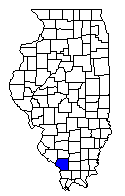
Joseph Duncan was a Kentuckian, having been born at Paris in that state, February 23, 1794. He is recorded as a sergeant in the Illinois militia, in Capt. Nathan Chambers' company of 30-day men in the War of 1812. He served from April 12 to May 12, 1813. He is also put down as a lieutenant in the second regiment, Samuel Judy, colonel, which served in the War of 1812. He is also said to have fought bravely with Colonel Croghan in the defense of Fort Stephenson in 1813.
At the close of the War of 1812, he settled at the "big hill," now called "Fountain Bluff," in Jackston county. "In 1814, there was quite a large accession to this county. Joseph Duncan, Dr. John G. Duncan, Polly Ann Duncan, old Mrs. Moore, their mother, and her son Ben, with several blacks, settled here. Joe Duncan built the best house in the county, near the river and under the bluff, and it was called the 'White House' as long as it stood. He renovated the mill, and it did considerable business. The Duncans lived there several years. Dr. Duncan died and was buried there." The foundations of the mill dam could be seen a few years ago. Here he occupied himself in the business enterprises common to those pioneer days. In 1823 he was appointed a mjore general of militia. In 1824 he was elected to the State senate from Jackson county. In 1825 he introduced the first legislation on public schools in the state. It was also the most rational that was suggested for many years. Mr. Duncan was elected to congress in 1826, took his seat March 4, 1827, and served continuously till he came home to be inaugurated in 1834.
Extracted from 1912 A History of Southern Illinois, by George W. Smith, volume 1, page 193.
Randolph |
Perry | Franklin |
Perry MO |
 |
Williamson |
| Union |


